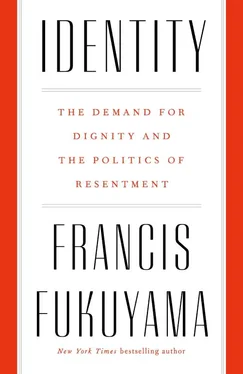If therapy became a substitute for religion, religion itself took an increasingly therapeutic turn. This was true of both liberal and evangelical churches in the United States, whose leaders found that they could reverse the trend toward declining attendance if they offered what amounted to psychological counseling services built around self-esteem. Robert Schuller, a prominent televangelist whose Hour of Power show was broadcast weekly to millions of viewers over several decades, and whose Crystal Cathedral in Garden Grove, California, was one of the largest churches in the United States, wrote a book early on entitled Self-Esteem: The New Reformation . {10} 10 Robert H. Schuller, Self-Esteem: The New Reformation (Waco, TX: Waco Books, 1982). Schuller’s books fall in a longer American tradition of self-help literature by authors such as Norman Vincent Peale. See for example Schuller’s Success Is Never Ending, Failure Is Never Final: How to Achieve Lasting Success Even in the Most Difficult Times (New York: Bantam Books, 1990).
Rick Warren, whose Church Growth Movement has transformed many thousands of evangelical churches in recent decades, has put forth a similar therapeutic message. His trademarked Purpose Driven Life movement emphasizes the importance of pastors attending to the “felt needs” of nonbelievers, deemphasizing traditional Christian doctrine in favor of an overtly psychological language. Like Schuller, and like the California task force, he downplays sin and any judgmental aspect of traditional religion; the Gospel is more of an “owner’s manual” for how to achieve happiness in this life rather than in the one beyond. {11} 11 Bob DeWaay, Redefining Christianity: Understanding the Purpose Driven Movement (Springfield, MO: 21st Century Press, 2006).
Luther’s Christian dignity was something hard to achieve; the Purpose Driven Life by contrast is available to everyone.
The therapeutic turn in the popular culture of advanced liberal democracies such as the United States was inevitably reflected in its politics, and in an evolving understanding of the role of the state. In the classical liberalism of the nineteenth century, the state was held responsible for protecting basic rights such as freedom of speech and association, for upholding a rule of law, and for providing essential public services such as police, roads, and education. The government “recognized” its citizens by granting them individual rights, but the state was not seen as responsible for making each individual feel better about himself or herself.
Under the therapeutic model, however, an individual’s happiness depends on his or her self-esteem, and self-esteem is a by-product of public recognition. Governments are readily able to give away public recognition in the way that they talk about and treat their citizens, so modern liberal societies naturally and perhaps inevitably began to take on the responsibility for raising the self-esteem of each and every one of their citizens. We noted already Supreme Court justice Kennedy’s opinion that liberty was not simply freedom from government action, but “the right to define one’s own concept of existence, of meaning, of the universe, and of the mystery of human life,” a view that could have come directly out of the Esalen Institute.
Therapeutic services came to be deeply embedded in social policy, not just in California but throughout the United States and in other liberal democracies. States began to offer psychological counseling and other mental health services, and schools began to incorporate therapeutic insights into the way that they taught children. This expansion took place in stages, in tandem with the growth of the American welfare state from the New Deal onward. In the early twentieth century, social dysfunctions such as delinquency or teen pregnancy were seen as deviant behavior that needed to be dealt with punitively, often through the criminal justice system. But with the rise of therapeutic approaches by midcentury, they were increasingly seen as social pathologies that needed to be treated through counseling and psychiatric intervention. The 1956 amendments to the Social Security Act allowed for federal reimbursements of a range of therapeutic services to strengthen family life and self-support. These subsidies were further enhanced by new amendments in 1962, leading to an explosion of caseworkers and caseloads in the following decade. Title XX amendments in 1974 broadened the coverage beyond the poor to middle-class recipients. {12} 12 Andrew J. Polsky, The Rise of the Therapeutic State (Princeton, NJ: Princeton University Press, 1991), 158–64.
This rapid expansion of therapeutic social services triggered a conservative backlash in the Nixon and Reagan administrations, along with efforts to cut their growth. Yet by then therapeutic responses to life problems were demanded by millions of ordinary people, who were now less comfortable turning to pastors, parents, companies, or other traditional sources of authority. The therapeutic state metastasized across a wide number of institutions, including a large nonprofit sector that by the 1990s had become the delivery vehicle for state-funded social services. {13} 13 Ibid., 199–200.
Universities found themselves at the forefront of the therapeutic revolution. This can be illustrated by the controversy that broke out in 1987 over Stanford University’s Western Culture core course. That year civil rights leader the Reverend Jesse Jackson led a group of Stanford students in chanting, “Hey, hey, ho, ho, Western Culture’s got to go”—which earned the university instant national attention. The existing core course was built around fifteen texts, beginning with the Hebrew Bible, Homer, and Augustine, continuing through Machiavelli and Galileo, and on to Marx, Darwin, and Freud. The protesters wanted to expand the syllabus to include nonwhite and female authors, not necessarily on the grounds that they wrote important or timeless books, but that their very inclusion raised the dignity of the cultures out of which they came, and therefore the self-esteem of students coming from those cultures.
The therapeutic motive underlying demands for changes in the curriculum was evident in the testimony given by Bill King, president of Stanford’s Black Student Union, in the original debate over Western Culture:
I know Professors… are simply preserving that tradition which they consider correct… But by focusing these ideas on all of us they are crushing the psyche of those others to whom Locke, Hume, and Plato are not speaking, and they are denying the freshmen and women a chance to broaden their perspective to accept both Hume and Imhotep, Machiavelli and Al Malgili, Rousseau and Mary Wollstonecraft… The Western culture program as it is presently structured around a core list and an outdated philosophy of the West being Greece, Europe, and Euro-America is wrong, and worse, it hurts people mentally and emotionally in ways that are not even recognized. {14} 14 Quoted in Herbert Lindenberger, “On the Sacrality of Reading Lists: The Western Culture Debate at Stanford University,” in The History in Literature: On Value, Genre, Institutions (New York: Columbia University Press, 1990), 151.
What is revealing about King’s statement is that his justification for the curricular shift is entirely psychological: the current canon is “crushing the psyche” of minority and female students, and hurting people “mentally and emotionally in ways that are not even recognized.” A wider reading list will not necessarily transmit valuable or timeless knowledge that would be educationally important; rather, it would raise the self-esteem of marginalized students and make them feel better about themselves. {15} 15 The overall trend of universities undertaking a therapeutic mission is described in Frank Furedi, “The Therapeutic University,” American Interest 13 (1) (2017): 55–62.
Читать дальше












